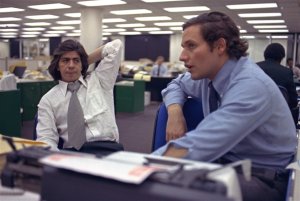“Beware of false knowledge; it is more dangerous than ignorance,”
George Bernard Shaw
This is an idea on the media and its ability to get away with giving us misleading information on a daily basis. This information could be harmful to us, yet some read it like it’s gospel truth and some even go further; changing their behaviors, ideas and even beliefs over it. Stories like the MMR Vaccine Controversy from 1998 may now be causing harm because some have decided not to get their children vaccinated. Plus with the rise in social media and instant news, the misinformation is delivered to us quicker and simpler. And day after day there are news articles being criticized for their information, but never held for any real account for the harm they have done. On social media sites, we are given a snippet of the information on the article and some decide an opinion without looking for more information, or the counter argument. It is a part of our new culture. Everything quick and in snippets. Not the full story, we are just given a simplified version, when the stories are actually a lot more complex.
At the center of this idea are the journalists. Journalists helped show us corruption in the past, Watergate is a prime example of this. The scandal that broke over Richard Nixon’s bugging escapades in 1972, were investigated by two men in particular, Bob Woodward and Carl Bernstein of The Washington Post. They discovered through their work, information suggesting that a cover up lay within the story of the burglary at the Watergate Hotel. Their sources, one famously known as “Deep throat,” led them to the Justice Department, FBI, CIA, and the White House and the eventual impeachment of Nixon.
 Here is an interview with Bernstein and Woodward.
Here is an interview with Bernstein and Woodward.
As scandal after scandal surfaced by the journalist, we began to see them as a force for good and those who we could trust to give us the facts on the matter. As this happened. The news media began to move more and more into different territory, beyond politics and social issues and toward topics such as science.
Fox News struggling with the moon
In 1998, The Lancet medical journal published a paper stating that the MMR vaccination had a direct link to autism. Andrew Wakefield, held a press conference before the papers publishing to talk about his discoveries. At first the press didn’t really jump on the story as it was a minor study. However, in 2001 and 2002, Wakefield published more papers saying the combined vaccination was unsafe, but with no new evidence. However, the news media went with it and reported anecdotal evidence as facts and suddenly there was panic. The British public went as far as demanding that Prime Minister Tony Blair reveal whether his youngest son Leo had been given the vaccine.
The problem was, the paper was a fraud.
A CNN report on the turn on information.
Wakefield had a number of conflict of interests. He applied for patents on a rival vaccine to the MMR, he received money from lawyers to help parents who believed their children had been affected by the jab prior to the publication. Finally by 2010, The Lancet fully retracted the publication and described the paper as “totaly flawed.” Wakefield was struck off the register. But the news media has moved onto other stories with no real consequence for the hysteria they have caused. Even though papers have shown how influential they were in spreading the lie without real in-depth research.
In this period rose a great number of “commentators” claiming to be “experts.” These shadowy figures are not held to account for what they tell us, no matter how harmful the information may have been. We are also being subjected to these days, public opinion and feelings on a matter as facts.
Dr. Ben Goldacre on “Bad Science,” in the media.
At the same time, social media sites on the internet became more popular. The chat rooms and messenger software of the late 1990s and turn of the century, had evolved into a space of self expression, information and online socializing. Information could be quickly shared through sites as Myspace, Facebook, Twitter and others. This took on a new and exciting form when we started to see uprisings, apparently fueled by social media.
The revolutions that took place between 2009 and 2013, which also became known as the Twitter revolutions, were apparently fed by social media. The news reported to us time and again that the regime had been toppled and the people were free of tyranny. Ex leaders fled for their lives or were served mob justice. This gave us a good feeling. A feeling of empowerment, that through the freedom on the internet, we could mobilize against any injustice and fight it.
The problem we face today with this easy and quick access to information and rolling news is, before facts are clarified, the information is half way around the world. And people spread the news, thinking that they are doing good; reporting to their friends and communities that something has been reported to give you cancer, or that there is a rapist or child abuser somewhere before the facts and trial have come to determine truth, or guilt.
Still today circulate memes and articles saying the MMR jab causes autism and that we should not immunize our children, and there is a strident group of people around the world who have come to believe it’s now a conspiracy, and that there are more dangers in vaccines than we are told. Even though these are not credible sources and the Wakefield papers have been collectively agreed as fraudulent, this group still believes in some kind of cover up, and this information is continually shared across the social media world as facts.
This is an article I came across last year by Alex Jone’s site Infowars.
http://www.infowars.com/how-the-us-government-admits-vaccines-cause-autism/
This doesn’t just seem to infect science anymore. Political and social issues are also being commentated on by “experts” and we see the news media creating harm here. Last year saw a rolling stone article expand into something quite chilling. A girl named “Jackie” had alleged she had been gang raped at the University of Virginia by seven men at a fraternity house. Through social media this article was shared and more news media jumped on the story. The word spread and the students and people were outraged. The house was picketed, vandalized and the students eventually suspended without evidence.
However the claims began to unravel shortly after as inconsistencies began to show in the story Jackie told the police, her friends and the different news media outlets she spoke to.
However, even though Jackie is generally not believed now, mob justice was served to innocent people before the whole story could be looked at and judged. The journalists we trust to inform us of the world around us, are as faulty as you and I and continue to publish fallacies without looking at the whole issue.
If we allow ourselves to blindly believe the news media straight away, before a real understanding of a topic, we are vulnerable to mob justice. If we can come together as the people did in the Twitter Revolutions, but instead over misinformation, that could be dangerous. Or misinformation on the MMR jab has lead to a rise in measles in children as some parents have decided not to get their children vaccinated.
However, we people are not held to the same regard. Politicians have to be careful what they say or they may be ousted. Public figures and celebrities are attacked for changing their minds and opinions. Yet the ones we have come to trust to empower us with knowledge, can get away with it and though on occasion, be a force for good, if the information delivered is wrong or misleading, the results could be devastating.



